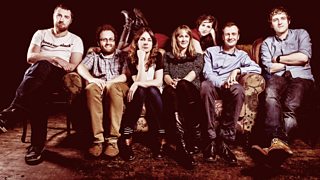My Comedy Writing Career - Including launching Radio 1's new podcast 'Kench'
Benjamin Partridge
Writer
What do you think inspired you to get into comedy? Were there particular shows or performers that you remember?
I can’t really remember that well! I remember loving . And I had a video, . I really smashed through the novels as a young teenager. And I remember going to see stand up during freshers week at university (line up: , , ) and something switching in my brain. And I was at uni in London so I started going to clubs run by g who I think is brilliant. But then I must have been into comedy before university because I remember dragging my friends to a really ropey stand up night in a hyper-rough pub in Cardiff when I was in sixth form. Absolutely dreadful.

Benjamin Partridge
Was gaining a place on the particularly significant? How did that come about and what doors did it open?
It was an absolute game changer for me. It meant that I moved to London and had a desk and a salary, working 4 days a week, 10am-6pm, writing, which is unheard of. I don’t think I’d be writing now were it not for the bursary.
They take on two people every year and I was invited to apply (it’s changed now, I think they advertise the role and anyone can apply). I was on their radar because I’d been writing for and had been in to do some trial stints on the . I had also co-written a sketch show in Edinburgh called which I think some of the producers had seen. I didn’t get it the first year I applied, but then I got it the following year.
It totally transformed the way I looked at writing. Before then, I was writing sketches and stand up for my own things and I had an approach to it that I think most people have when they start out, which is that I went about my everyday life and waited for the occasional idea to hit. Working at the ±«Óãtv was the opposite of that – there was lots of writing for topical shows like the News Quiz (which I still do) where the job is to sit down and write a couple of pages of jokes about a news story, and sometimes that might be something quite dry, like pension reform or something that the shadow ±«Óãtv Secretary has said.
When you’re forced to do that, you very quickly begin to be able to write to order. And once you’ve done that for a year, you’re no longer daunted by the idea of writing a joke. Because you’ve written thousands. And now I feel like I could write you a joke about anything. Not necessarily a great one. But I’d have a stab at it.
Of course ideas hitting you as you go about your everyday life are still more than welcome, but knowing that in your back pocket you have the ability to grind it out is really good. And often, when you look back on stuff that felt a bit more serendipitous versus the stuff you wrote with a 20 minute deadline on a dreary afternoon in an open plan office, there isn’t actually much difference.
It also taught me how to write for other people. Of course it’s very important to have your own voice and important to keep writing stuff that is just yours, but the ability to write in different styles makes you employable.
If I was feeling highfalutin I might say that it taught me to see writing as a craft as well as an art.
And it also meant I met all these people – producers, other writers - who I’m still working with today. As you can tell from this overlong answer, I really think it was vital to my career.

Newsjack - the ±«Óãtv Radio 4 Extra comedy show that anyone can write for
A lot of your work has been for Audio including panels shows, sketch comedy and sitcom (Radio and Podcast). What appeals to you particularly about this medium and in what ways is it great (or less great) for comedy?
One of the main things is you don’t have to convince someone to part with however many hundreds of thousands of pounds a TV series costs.
With audio there’s less between you and the final product. When you’re making a radio show, often there are only four people involved, full stop. The fewer people involved, the smaller the chance that one of them will be an awful wanger.
Also you can sort of do anything. Because there’s less pressure you can definitely be weirder on the radio than on telly. And when you’re podcasting you can be as weird as you like.
That said, I’ve had a really nice time doing the odd bit of telly writing too. And the pay is better. My almost entirely audio-based career is just how the cards have fallen. I got the ±«Óãtv radio bursary job and then after that I was lucky that ±«Óãtv Radio Wales started investing in comedy so I was able to make some good shows for them, like and . And then more recently podcasting has allowed me to make work that is much more “me” than anything else I’ve ever made. I would like to do more telly stuff but I don’t think there’d ever be a time when I wouldn’t want to be making audio.

Kench - the new weekly Comedy podcast from ±«Óãtv Radio 1
How did you get involved with Radio 1’s new comedy podcast Kench? What’s the premise of your show Ray Moss - No Stone Unturned and what was the development process?
Back in October I got an email from Clarissa Maycock, who is one of the producers of the podcast, asking if I’d be interested in pitching something to Radio 1, who had decided they wanted to make comedy podcasts.
I then met Lachlan Macara, the other producer, and they were clear that they were interested in me making the sort of show I wanted to make. We were all on the same page from day one, which was great.
We went through a few ideas before settling on what we have now, which is a show hosted by Ray Moss, a wannabe investigative journalist and detective who solves the absurd mysteries of his listeners.
I had been making a sort of parody of for my own podcast, , and the producers liked the way Beef and Dairy in general pokes fun at various podcasting tropes like adverts etc., so initially we talked a lot about parodying well known podcast series like . But we quickly drifted away from that idea, largely because Serial was 4 years ago and there have been lots of good parodies of it already. And in general I began to feel that podcasting had already been parodied really well by other people. For example, as we sat down to work out the series, the sketch duo made a really good parody of style podcasts for Radio 4 and as we started recording the first bits of Ray, brought out which is a great parody of true crime podcasts. They basically nailed it, so that made me feel like we’d made the right decision.
Also with things that are an out-and-out parody, sometimes it can feel as if once you’ve got that it’s a parody, there isn’t really much else to it. And so while Ray Moss has a parodic element to it, and it’s certainly inspired by lots of podcasts, hopefully it’s also its own thing.
The producers pitched the show to Radio 1, I assume leaving some sort of large bribe or threat in an envelope on their desk, and we were commissioned to make four.
In terms of the way it’s made, pretty early on I think we decided we’d make it in a similar way to how I make Beef and Dairy Network which is recording long improvised interviews, which are then heavily edited down into the final thing. It’s a time-consuming process but I love the way it makes everything sound natural, which I think makes it more funny.
Listen to a clip from Ray Moss - Ray uses the old investigator's trick of pretending to deliver a pizza. Classic Ray Moss.
Have you been given any particularly useful writing advice that has stayed with you?
The writer gave me some good advice about submitting your writing. He was script editing Newsjack, which is an open door sketch show on ±«Óãtv Radio 4Xtra and I was one of the commissioned writers which means that you get to go into the ±«Óãtv and write for the show in the writers’ room rather than sending stuff in from home. We’d have the writers meeting at the beginning of the day and work out what sketches everyone was going to write, and then go away and write them. Once my first drafts were done, I’d email then to him and the email would say something like “I think this is a bit shit but maybe there’s something in it??????”. One day he took me to one side and quite rightly pointed out that it’s a bad idea to send someone a script with a covering email that says it’s shit because it will colour the way they read it. It’s great advice. No matter how ropey you feel your script is, don’t do it down before the person has even read it. And more generally, back your work. Obviously don’t present it as if you think it’s a flawless masterpiece, but at the same time you don’t get any points for being cripplingly self-deprecating about it.
And secondly, it’s not advice as such but the writer once used a phrase that comes back to me all the time. When a line is okay but not great, it’s an “Elton” (Elton John – “it’s a little bit funny”). I’ve found that these lines can be killer because they don’t demand to be replaced like an actively bad line, but the dispiriting half laugh that an Elton gets you is worse than silence. So keep an eye out for them. You can usually think of something better.

The writing team on 'Here Be Dragons' a sketch series featuring a who's who of up-and-coming Welsh comedy talent (including Ben Partridge)
What would be your top tips to someone starting out now in comedy?
You can’t do it on your own. Or rather, I can’t do it on my own and maybe you’re like me. Starting out in stand up was so good for me because through doing gigs I met a load of people who I still work with to this day. I write a lot with who was doing stand up in South Wales at the same time as I started. This latest thing, Ray Moss, was made in collaboration with many people, not least and , who I’ve worked with on things now for almost 10 years.
Obviously not everyone wants to do stand up, but maybe try and find other writers or actors who’ll work with you. You’ve got to have a gang. All my best stuff I’ve done is with other people. Maybe that means I’m crap. But I think we’re all a bit crap in our own way so we can all balance out our individual crapnesses. Also it’s so much more fun, and that’s the whole point, right?
and
